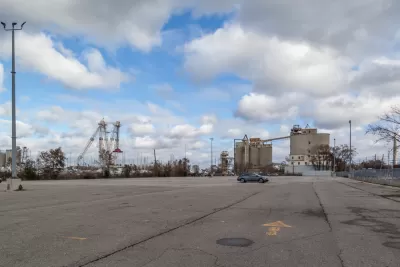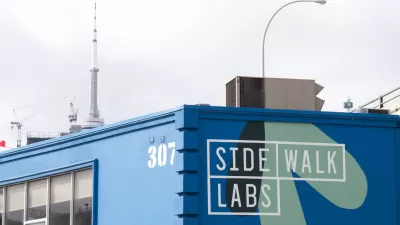Just shy of a year after Sidewalk Labs pulled the plug on its "smart city" experiment for Quayside, Waterfront Toronto has a released a request for qualifications to move forward with a new, "people-centered" vision for the waterfront.

Waterfront Toronto has launched a new international competition seeking a development partner for land in the Quayside area of the city—land previously planned for "smart city" experimentation by Sidewalk Labs, a subsidiary of Google parent company Alphabet.
After Sidewalk Labs canceled its plans in May 2020, citing the economic uncertainty of the pandemic as an obstacle for financial viability for the project. But the proposal was beset by controversy and a skeptical public throughout its process (which began in 2017 and produced a master plan in 2019).
According to a press release from Waterfront Toronto, the new project will strive for lofty design ambitions while also creating a sustainable community for people of all ages, backgrounds, abilities and incomes. "The first step in this effort is to issue a Request for Qualifications (RFQ) to identify potential development proponents with the proven experience, design portfolio, financial resources, and shared vision necessary to bring Quayside to reality," according ot the press release.
An article by Leyland Cecco, writing for The Guardian, focuses on the new "people-centered vision" for Quayside. The article inclues a soundbite from Mike Lydon, who says the failed Sidewalk Labs plan for Quayside is a cautionary tale for cities flirting with "smart city" technology. "To bet the farm on technology that redesigns our entire streets and relies on apps and sensors doesn’t really jive with how human beings actually use public spaces – and how they want to live in cities," says Lydon in the article.
FULL STORY: Toronto swaps Google-backed, not-so-smart city plans for people-centred vision

Planetizen Federal Action Tracker
A weekly monitor of how Trump’s orders and actions are impacting planners and planning in America.

Map: Where Senate Republicans Want to Sell Your Public Lands
For public land advocates, the Senate Republicans’ proposal to sell millions of acres of public land in the West is “the biggest fight of their careers.”

Restaurant Patios Were a Pandemic Win — Why Were They so Hard to Keep?
Social distancing requirements and changes in travel patterns prompted cities to pilot new uses for street and sidewalk space. Then it got complicated.

Platform Pilsner: Vancouver Transit Agency Releases... a Beer?
TransLink will receive a portion of every sale of the four-pack.

Toronto Weighs Cheaper Transit, Parking Hikes for Major Events
Special event rates would take effect during large festivals, sports games and concerts to ‘discourage driving, manage congestion and free up space for transit.”

Berlin to Consider Car-Free Zone Larger Than Manhattan
The area bound by the 22-mile Ringbahn would still allow 12 uses of a private automobile per year per person, and several other exemptions.
Urban Design for Planners 1: Software Tools
This six-course series explores essential urban design concepts using open source software and equips planners with the tools they need to participate fully in the urban design process.
Planning for Universal Design
Learn the tools for implementing Universal Design in planning regulations.
Heyer Gruel & Associates PA
JM Goldson LLC
Custer County Colorado
City of Camden Redevelopment Agency
City of Astoria
Transportation Research & Education Center (TREC) at Portland State University
Camden Redevelopment Agency
City of Claremont
Municipality of Princeton (NJ)




























